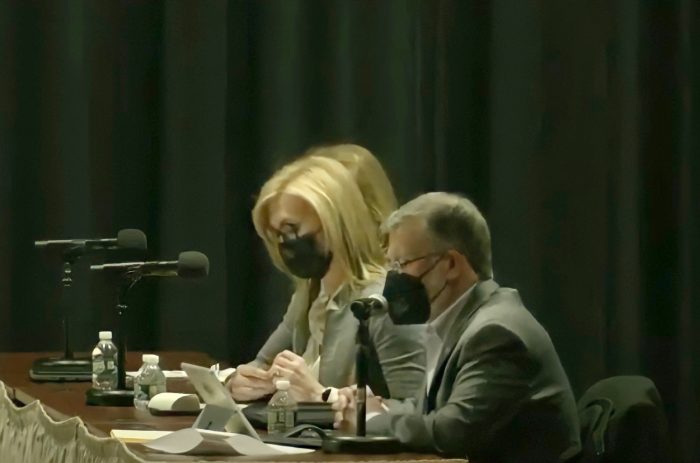By Andrea Paldy
In a departure from its normal meeting format, the Three Village Central School District held a town hall last Wednesday, Jan. 26, that gave the public an opportunity to ask administrators a broad spectrum of questions that included the budget and enrollment, COVID protocols, mental health support, DEI (diversity, equity and inclusion) and school start times.
The town hall, which was held in-person at the Ward Melville High School auditorium, also offered a virtual component. More than 100 viewers tuned into the two-hour-long YouTube livestream. District administrators answered questions that had been submitted ahead of time.
Alan Baum, executive director for human resources and secondary curriculum, facilitated the town hall. While the district was open to various structures for future forums, Baum said the benefit of pre-submitted questions was that it ensured that answers given were “accurate, comprehensive and detailed.” Administrators, he said, had the benefit of being able to gather the necessary information.
Concerns about the ongoing pandemic prompted an expected avalanche of questions about procedures, masking and vaccines and represented both the sentiments of parents who felt the district was being overly cautious, as well as those who believed it could do more. Questions about this dominant topic included whether the district had looked at studies related to the psychological and learning effects of masking and distancing on students, and whether the district would take legal action to end the mask mandate. Concerns were also raised about masking requirements not being enforced and why students and teachers were not mandated to take the vaccine.
Executive director of student and community services Erin Connolly fielded many of these questions. She said the district would not take legal action against the mask mandate, and that due to the newness of masking and social distancing there have been no studies available about their long-term effects. She added that concern about possible effects is behind the district’s implementation of “extensive” SEL (social emotional learning) programs targeted at mitigating issues related to COVID-19.
There has been no decision to mandate the vaccine for students, but if there were one, it would be made by New York State and not by the school district, administrators said. Teachers, on the other hand, are required to be either vaccinated or to test regularly, said Dawn Mason, executive director for pupil personnel services. She added that vaccination is a personal decision to be made with one’s doctor.
Pandemic-related questions also included whether the district would go remote again or offer a remote learning option. Superintendent Cheryl Pedisich said the district would not offer a remote learning option, though it did offer livestreaming for secondary students and tutoring for elementary students during the omicron surge. The decision to go remote would be based on local infection rates and availability of teachers and staff. Such a decision would be made “with careful consultation with the board of education, with our administration and the department of health,” Pedisich said.
“We view our schools to be the central pillar to the infrastructure of our community and, as such, schools are critical. They are essential to student learning, social and emotional and psychological growth, and so we feel very, very strongly about the importance of in-person learning, and we’ll do everything we can to keep our schools open, healthy and safe,” the superintendent said.
Administrators also spoke about the district’s ongoing focus on student mental health, saying district programs focus on “the whole child” — academic, as well as their social, emotional and physical health and well-being.
The district’s enrollment has seen a decline over the past 15 years. When asked to compare current enrollment and staffing — 5,651 students and 589 instructional staff members — to those of the 2012-13 school year — 7,307 students and a staff of 591 — it became clear that staffing levels, which include some “COVID hires,” are virtually the same at present, despite the almost-2,000 student decrease over the years.
In addition to reduced class sizes and more electives, Jeff Carlson, deputy superintendent, said Three Village is providing more services to students and has added more social workers and psychologists to the staff over the years after having cut staffing down to 545 full time equivalents in 2013-14.
“Every school district has social workers and psychologists,” he said. “We have more than most. We’ve worked hard to build those numbers back up in staffing.”
Pedisich later said current enrollment numbers do not include the district’s prekindergarten students, which can range between 180 and 200 students. Though the district saw a decrease in the secondary populations, it is currently seeing a bump in elementary students by 105 students, which Pedisich attributed to changes in the housing market and families moving from the city because of the pandemic.
Paul Gold, director of social studies and assistant principal of Ward Melville, answered questions about the district’s DEI committee, which he chairs. The district is not teaching critical race theory, widely known as CRT, which he said is taught in law schools and “has no place in K-12 schools.” Gold added that what the district does teach about race and racism is “through the lens of history” and that teaching “does not come with blame or shame. It comes with context and conversations about how over time so many Americans have worked to promote equity and equality for so many groups that have been historically marginalized.”
In addition to clarifying that equity and inclusion go beyond race to include gender, physical and intellectual ableism and sexuality, Gold responded to questions about funding for the district’s committee. The committee is populated by teacher, parent, staff and administrator volunteers who are not paid. He also explained that professional development is among the committee’s priorities and that one of its subcommittees is working on professional development opportunities for staff.
Questions were also asked about the district’s commitment to finding a way to implement a later start time for secondary students. Pedisich, who acknowledged the health benefits of a later start for students, said the board of education would have to discuss reinstatement of the late start time committee, which has been on hold since the pandemic.
A recording of the forum, which also covered transportation, testing and school lunches, can be viewed on the Three Village Central School District YouTube page.








